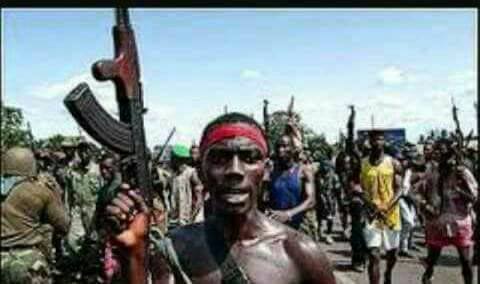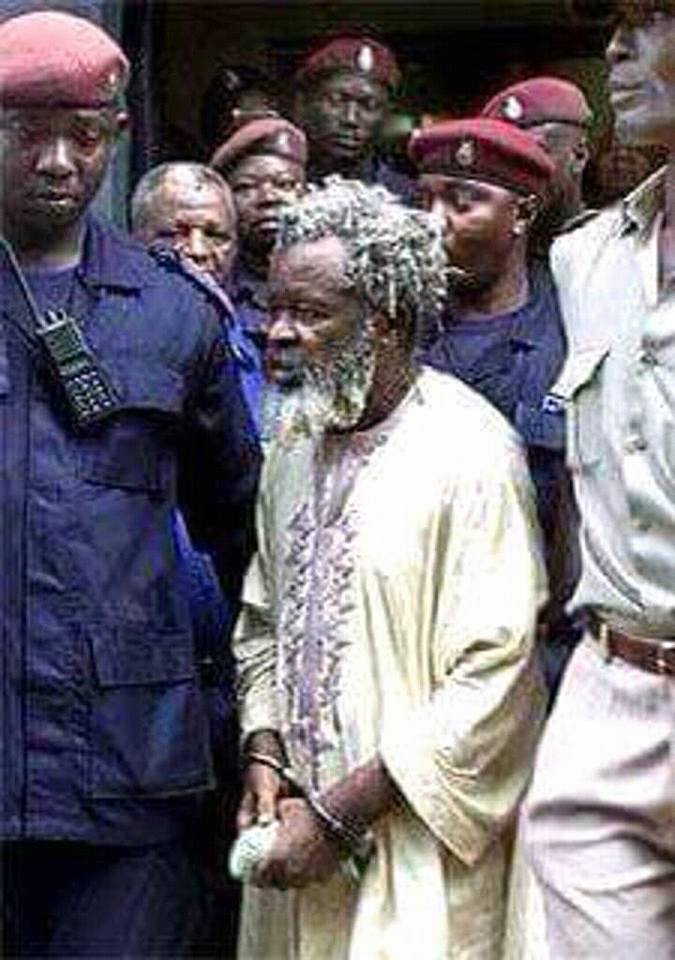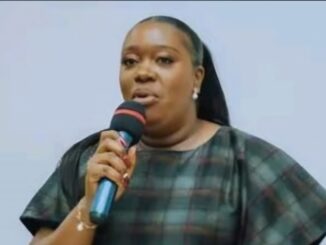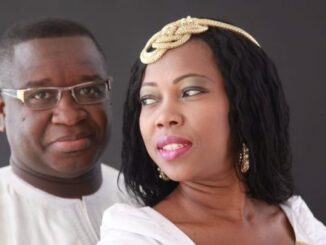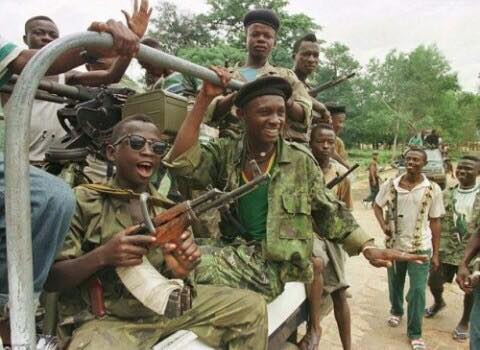

In the days leading up to that fateful day, the whole country had collapsed like a pack of cards under the combined invasion of the RUF and the AFRC. By Christmas Day 1998, the rebels led by the late Solomon A.J. Musa were at Waterloo and Freetown was under siege. As though by some divine intervention, S.A.J Musa died a mysterious death on the outskirts of the city before the year rolled over. His death delayed the attack on the city as we were later informed. Following reports of his death, we knew it was just a matter of time before all hell broke loose. The civil society coalition was now working with ECOMOG, the Kamajors and many more people. We no longer had an Army. Our military had turned against us and they were on the move to slaughter us. Several street demonstrations and meetings were held at various parts of the city to strategize on how to protect the city. The city was completely full and later we learnt that a chunk of the rebels had already entered in the city as civilians and were just waiting for instructions to attack.
When I visited State House on 5th January together with Allie Bangura and others (after we came from the check point mounted at Rokel) to inform the government that even the Gbethis who had been asked to man checkpoints had no torchlights, not to talk of arms and ammunition, the chaos we met at State House told me that it was all over. We were sitting ducks. There was so much panic at State House and people were running helter-skelter. We could not talk to anybody. I went home feeling extremely despondent and accepting for the first time that the city was about to fall. I got a call that evening from Alpha Timbo who was then Secretary General of the Teachers’ Union informing me that he was not going home to Kissy after spending the day at the Ministry of Education negotiating for teachers’ salaries. He told me he had information that that night was crucial for us. I shared with him my experience at State House. He was worried that his family was still at Kissy and he had no idea what he could do to keep them safe. That evening I gave a defiant interview on VOA and BBC attacking the invading rebels. Nobody went to sleep.
I got my first call at around midnight from Alpha Timbo breaking the news that the rebels had entered with an attack in Wellington. I got out of bed, got dressed and decided to monitor the invasion on outskirts of the city. My next call came from the late Hassan Barrie, President of The Sierra Leone Labour Congress who called to inform me that his neighborhood had fallen. I also received calls from coalition members when Clay Factory fell, and all the IDPs were pushed out onto the streets. Shortly thereafter, when the checkpoint at Kissy Dockyard Ferry junction manned by ECOMOG (which we thought was a very strong defence) fell, we knew we were in trouble. The ECOMOG soldiers had been overwhelmed by the number of civilians on the streets and just could not open fire. My next call was from Marie Bangura (now Marie Bob Kandeh). She was staying off Fourah Bay Road and came out to watch the movement of people. She was the first person to give me a clear description of the strategy the rebels were using.
The rebels had actualized their assault on the city by using innocent civilians as human shield. Thousands of people were on the move, marching towards the city center some with vehicles but carrying most of their belongings, whilst the rebels hid amongst and behind them. I asked Marie not to leave her location, but to stay behind and monitor the situation and give us more details. She agreed and became a very good source of information for us.
Prior to December 1999, the Civil Soceity coalition that had fought the RUF/AFRC government had been reactivated. This particular morning, we were frantically making phone calls. Dr. Julius Spencer and Allie Bangura had mostly been working with the ECOMOG troops to keep their morale up and also coordinating with our Ambassador in Nigeria, Joe Blell for more support and reinforcement. The Head of ECOMOG based in Freetown was General Amadu. The Head of ECOMOG West Africa was General Timothy Shelpedi.
Mrs. Fatou Jalloh, who was my landlady at my Liverpool Street office was the next person to call me. Central Freetown had fallen. The size of the human shield had doubled according to reports from Mrs. Jalloh. It was at this point that we realized that if we did not make a stand, the entire city would fall. We coordinated with ECOMOG and advised them that the defense of the city must be strengthened at the Congo Cross bridge. Based on our advice, ECOMOG decided to deploy all tanks and artillery at the Congo Cross bridge.
By dawn, the entire city was awake and continuously on the phone. ECOMOG had assembled all its troops at Congo Cross Bridge to defend the rest of the city. As the history books have recorded, that was where the final battle for Freetown took place. When the crowd of civilians arrived at the bridge, they were commanded to lie on the floor and ECOMOG cordoned off that area and all civilians were detained for several hours. Later, I was informed that the battle at Congo Cross was quite a fierce one and very destructive. Allegedly, my name was one of the names on the “most wanted” list the rebels had drawn up as they prepared to march on the city. Our names were found in the pockets of some of the slain rebels.
As the rebels retreated from Congo Cross bridge, we got reports of civilians who had been forced to come out and wave white bed linens, or any white material as a sign of peace and also to dance for the rebels in rebel controlled areas in Eastern and Central Freetown. We kept receiving information about people who were being slaughtered in their homes, houses being burnt alive with people still inside, incidences of rape, and the amputation of civilians by the retreating rebels. Some of the rebels from the battle at Congo Cross bridge fled into the Ascension Town vicinity, others headed towards Hill cut Road and some ventured into Tengbeh Town. On that gloomy Wednesday morning, even the military barracks at Wilberforce came under artillery attack. At some point, I had cause to call for reinforcement at Tengbeh Town and two armored cars were deployed about two hundred yards from my house at Tengbeh Town. For two days, series of battles took place around the city. By the end of the first day, Freetown was divided into two parts – the east and central part under the control of the RUF and AFRC coalition, and Western Freetown starting from Congo cross under the control of ECOMOG. People in rebel controlled areas started using all known as well as discovering all unknown side roads to move to the western part of the city.
Those 48 hours after the initial invasion of the city were the most nerve-wrecking for me because the electricity supply had been cut off and the phone lines had given up the ghost. I was totally incommunicado.
On the third day, I sat my twelve-year-old son down and tearfully informed him that there was a great possibility that I would not survive the rebel incursion. I handed him a notebook with all the names of my friends around the world who he was to contact should he make it out alive; all the foreign currency I had on me; my cheque book in London and gave him directives to jump the fence and hide in our neighbor’s compound when the rebels came for me, and subsequently find a way to go to Guinea. He had instructions on who to contact when he got to Guinea.
On the 10th January, the much expected knock on my gate came. I was in the process of saying my final goodbyes to my son and dispatching him to the neighbor’s compound when I heard Dr. Julius Spencer’s voice. Our gate was opened and he entered fully dressed in military attire. He informed me that the government had fled and that we are on our own. I got dressed and we all assembled at the Wilberforce Military Headquarters. Within the day, we reached out to all our coalition members including Alpha Timbo, Allie Bangura, Festus Minah and many others. An office was given to us and FM 98.1 became our main means of communication to mobilize people. Hundreds of young people responded and we set up shop at the Vine Memorial Secondary School and developed strategies as well as rallied support for a demoralized ECOMOG, who were being sent reinforcement from Nigeria. Nigerian soldiers were being parachuted by helicopters into the city in their hundreds. We were defiant and determined to win back total control of our city.
We managed to open the National Stadium after the rebels were pushed back beyond St. John and made an announcement for all IDPs to assemble there. I walked from the National Stadium beyond Ascension Town bridge to inspect the queue of people, picking out old people, mothers with young babies, wounded people, to bring them up front the queue at the Stadium. It was a very painful experience. All these people had lost their houses and had barely managed to escape to the west end to seek refuge. The next biggest task was to pick up the corpses on the streets and to bury them in mass graves. We turned to young people with “omolankes” who volunteered to pick up the corpses littering the streets, which by now were being devoured by stray dogs and vultures. We requested help from the British war ship along the Atlantic Ocean, which delivered disinfectants in 5 gallon containers to clean the city and rid it from the stench of the dead corpses. Our Ambassador in Nigeria, Joe Blell, played a crucial role in helping us to negotiate with the Nigerian government to send us reinforcement. Nigeria at this time was undergoing its own transition after the death of General Abacha in June 1998, but General Abubakar the Interim President was gracious enough to send thousands of young Nigerian men, who came to rescue us and made the ultimate sacrifice to bring us peace.
With no government to man the affairs of the State, the Civil Society coalition had to stand in the place of a government and stir the ship. We visited Cline Town with ECOMOG tanks to inspect stores that had food supply. By this time, the rebels were on the retreat out of the city. We contacted several NGOs to provide blankets and other items to the thousands of people at the stadium.
After a few days, President Kabbah resurfaced and we held a joint meeting between the Civil Society coalition that had managed the crisis and the Government at his Hill Station residence. The meeting was chaired by a humiliated and subdued President. The most angry member of our team was Alpha Timbo, who did not mince his words in lambasting the incompetence of the government and their failure to listen to all the warnings that had been given to them. President Kabbah apologized and we all asked him to call President Abubakarr of Nigeria to thank him for his response to our request to send more troops without even a phone call from our own President. The rest my dear friends is history.
We lost a lot of young people during the assault on Freetown who came out to join the Nigerian troops who were parachuted into Freetown. State House for instance was lost and taken more than 5 times. These young men and women drew maps of the city to help the Nigerian troops to acquaint themselves and understand the streets and geography of Freetown. These were thousands of young volunteers. My greatest regret is that we have never celebrated these heroes and have never tried to document them. In hindsight, it is undeniable that it was the people of Sierra Leone, thousands of them who paid the heaviest price of the war.
Today, on this very solemn day, I want us to remember all those we lost to the war especially the students and civil society members who stayed behind to confront the AFRC, when most of us fled into exile in Guinea after the 1997 coup; the civil society members and people who gave their lives to save the city after the January 6th attack and finally the people who confronted Foday Sankoh at his house in May 2000 and got killed, when it was realized that he intended to derail the peace process.
As we remember January 6 1999 as one of the worse days during the 12 year civil war in our country, I want to use this opportunity to thank all the thousands of Sierra Leoneans, mostly young people, but also men and women who responded to our call all those years ago to save our motherland. Most of them were killed and we never got the opportunity to mourn them properly and document their story and heroism. We owe it to them to protect Sierra Leone.
Most of us who worked together at that time are now in different political parties. Unfortunately, as politicians we always refuse to learn from the lessons of the past. I have recently decided to talk on some of these issues because our country faces very serious political crises especially within the opposition party. As our electioneering process is set to commence, we must always remember that many Sierra Leoneans paid the ultimate price for this peace we now enjoy, and as such it is imperative that we jealously guard it at all cost.
Eighteen years since the brutal Freetown Invasion…
By Jarrah Kawusu–Konte
Today January 6 is a day every Sierra Leonean should remember. It marks the 18th anniversary of the January 6th brutal invasion of Freetown.
Today should be a moment of reflection and truth, it should not be a moment of misrepresentation of the facts, it’s should not be a moment to perpetuate negativity… It should be a moment to call out corruption in the public sector, to call out thieves in civil society and thieves in the private sector. It’s a moment to call out and make resolutions against all those tendencies that led Sierra Leone to that dark history.
Those who arrogate to themselves such roles should do so fairly and honestly because it’s also a moment to reflect on the progress we have made 18 years on.
Certainly, Sierra Leone is a better place today than 18 years ago. Our country’s democracy is better than it was 18 years ago, Sierra Leone is by far more cohesive now than 18 years ago. Sierra Leone is by far more peaceful now than 18 years ago. Sierra Leone is certainly better in upholding human rights now than 18 years ago and if some people do not recognise the progress Sierra Leone has made in the last 18 years either because of foxy eyes tinted by political mischief, or by sheer dishonesty, the majority of the people of Sierra Leone clearly see how far we have come and the important gains we have made through our collective efforts. We still have challenges but we have certainly move forward; Sierra Leone is certainly not where it was 18 years ago!!
May the souls of the departed rest in peace!
JANUARY 6, 1999 WAS CAUSED BY POOR LEADERSHIP
By Idrissa Conteh —
Following the restoration of the democratically elected government of President Ahmad Tejan Kabbah in March 1999, the priority of his government would have been security!
However, this was not the case. Having reversed the 1997 coup d’etat, the extremely fragile SLPP administration comported itself as if that was the end of the war though scores of people were being massacred in the countryside.
If the SLPP administration had wisdom and foresight, it would have embanked upon the massive recruitment and training of military personnel equipped with the necessary military gears to pile pressure on the rebels and eventually force them to surrender.
After the overthrow of the AFRC led by Maj. Johnny Paul Koroma, the security of the state remained in the hands of ECOMOG troops who were thinly deployed across the country.
Some of the deployments I saw in Kambia, Port Look, Moyamba and Makeni could be best described as suicide missions. Some of these areas had less than 20 soldiers!
So, when the rebels started consolidating their positions following a fake ceasefire deal with the SLPP administration, it was so easy for them to overrun the ECOMOG troops positions in the interior as they advanced towards Freetown.
As the rebels kept advancing to Freetown, the Minister of Information, Julius Spencer, put out a stupid propaganda material on the SLBS radio dismissing rumours of an imminent attack on Freetown as a mere tyre fire at Cline Town.
Instead of making a well planned military strategy to keep the rebels at arm’s length, the SLPP chose to fight them with a battalion of lies!
The rebels invaded Waterloo twice killing scores of people and razing many houses to the ground. The SLPP didn’t know what to do to counter the rebel assaults.
A journalist, Dominick Kabbah Kargbo who likened the rebel numbers to manna from heaven was arrested and detained at the CID for merely telling the BBC that the rebels had the capacity to retake Waterloo at anytime.
I was in Wellington when I was violently woken up by heavy machine gun sounds around midnight. Tens of thousands of people infiltrated by heavily armed rebels headed towards the Western part of the city.
ECOMOG troops retreated towards the Western Area. I joined the crowd with my two junior brothers but we rushed into the old City hotel as ECOMOG troops engaged the rebels at Lightfoot Boston Street with unending exchange of fire.
The rebels came to the hotels and screened us as they wanted know whether we had soldiers or kamajors among us.
The rebels asked us to return to the East as they said they had come to liberate us.
We jumped over scores of dead bodies from Lightfoot Boston Street Wellington.
At the PWD Junction, we were stopped by a killer group. The scene was one of houses in flames, dead bodies and persons wailing in agony. The rebels asked me to sit on the floor. I obeyed at once. All those fleeing with me stopped and begged the rebels to free. They told them I was a good tailor in the community.
The rebels told me to get up and off load myself. I was dressed in a jean suite which they wanted. I took off my jean trousers and top and handed them to the rebels whose guns were all pointed at me.
Another rebel took my pair of sneakers and belt. I could not move when they asked me to go! An old man came to my back and pushed me into the crowd. We ran together.
I stayed with my colleague journalist, Abdul Kandeh Turay for 3 weeks at Thunder Hill.
As the massacres and amputations continued, Spencer told the BBC that the entire city had been liberated only for people who attempted to flee to safe areas to be killed in large numbers like flies.
Two ministers, Dr. YM Khroma and Mr. MB Sesay who had gone to help evacuate their relatives fell into rebel nets at Goderich Street and were slaughtered at the Kissy Road cemetery like cows.
To be continued…
WHY SIERRA LEONEANS SHOULD NOT ACCEPT ALIE KABBA SLPP FLAG BEAR CANDIDATE
Just connecting the dots…
Alie Kabba assumed the position of co-ordinator of the RUF and he caused the divergence of paths and purpose of the RUF because of his corruption. The trainees in Libya accused him of “sitting on millions of dollars” and benefiting from their recruitment for training. Alie Kabba was the key ideological driving force of the RUF. He decided to opt out after stealing millions of dollars. Into resultant leadership vacuum, Foday Sankoh and a handful of cohorts led an insurgency alongside Charles Taylor’s NPFL an insurgency which reduces Sierra Leone to rabble. Should we accept someone like Alie Kabba?
Alie Kabba willfully and knowingly contracted a second marriage (or going through the form of a second marriage) while his first marriage, to his knowledge, is still subsisting and undissolved [BIGAMY]. He also falsely swear, and violated oath or a vow, which he violated by voluntarily swearing to false facts, or to what is untrue [PERJURY]. Should we accept someone like Alie Kabba?
I know Alie Kabba far too well for his own comfort! He was made the first democratic President of once “CHICAGOLAND ASSOCIATION OF SIERRA LEONEANS”, and behind the backs of his colleagues he converted the group into his personal property by changing it into a “Service” community project of his, fired every Sierra Leoneans, hired a single uneducated Liberian girl, [WOMAN LAPPA] and changed the name to UAO.. There is no Sierra Leonean left in the group that was created by Sierra Leoneans. Should we accept someone like Alie Kabba?
Personally, I have my doubts, and what I told some of his supporters that they did not believe are coming to pass now. Some even called me to thank me after finding out themselves and eventually quitting him! Just be warned, Alie Kabba is as sly as the fox.
#Momodu Jalloh
Some 17 years ago on a cold harmattan Wednesday morning, the whole of Freetown had been sieged by rebels and sobels killing people, laming others and destroying properties. In this wanton destruction, my father met his untimely death in his resident at Krootown Road. We missed him but we have nothing to do than to thank God as Christians. Rest In Peace Boys!!! THOMAS JOSEPHUS DIXON

